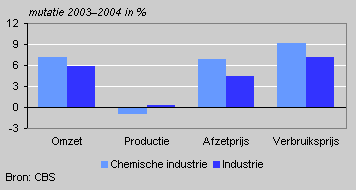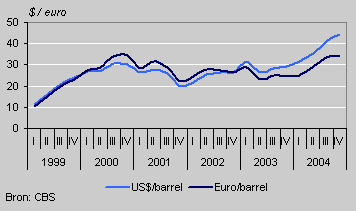Oil prices push up turnover in chemical industry

2004 was not as good a year for the Dutch chemical industry as it seemed on the face of it. Last year this sector sold 34 billion euro worth of chemical products, pushing up turnover in this sector by 7 percent from 2003. This increase in turnover is closely connected with the increase in oil prices. In 2002 and 2003 turnover increased by 0.5 and 5 percent respectively. The volume of production on the other hand fell by 1 percent.
Turnover, production, selling price and price of intermediate consumption

Lower turnover per working day
Manufacturers in the chemical industry put up their prices by 7 percent last year, which had a positive effect on turnover in this sector. In addition 2004 had three more working days than 2003. Statistics Netherlands puts the positive effect of the extra working days at around 1 percent. If the higher prices and the working day effect are taken into account in the calculation of the turnover, the resulting in average daily turnover is 1 percent lower last year than in 2003.
Production down slightly
From 1999, production in the chemical sector had constantly been higher than twelve months previously. This changed in July 2004 when production came out lower than in July 2003. The trend continued in subsequent months. The main causes for the decrease in production were major maintenance of production plants and the reduction in stocks of finished products. Ultimately, last year’s production was 1 percent lower than production in 2003.
World market prices North Sea Brent in dollars and euros

Increasing demand pushes up oil prices
Turnover in the chemical industry correlates very strongly with oil prices. Last year the unrest in Iraq and Venezuela and the impending bankruptcy of Russia’s Yukos Oil caused problems in the supply of oil. On the demand side of the oil market, the recovering world economy had an upward effect on oil prices, also because of the rapid growth of the economies of India and China. This pushed up the price of a barrel of North Sea Brent oil to a record of more than $ 51. These developments led to a 9 percent increase in prices for intermediate consumption in 2004. The favourable rate of the euro against the dollar was a bright spot for chemical companies, however.
Hans Draper